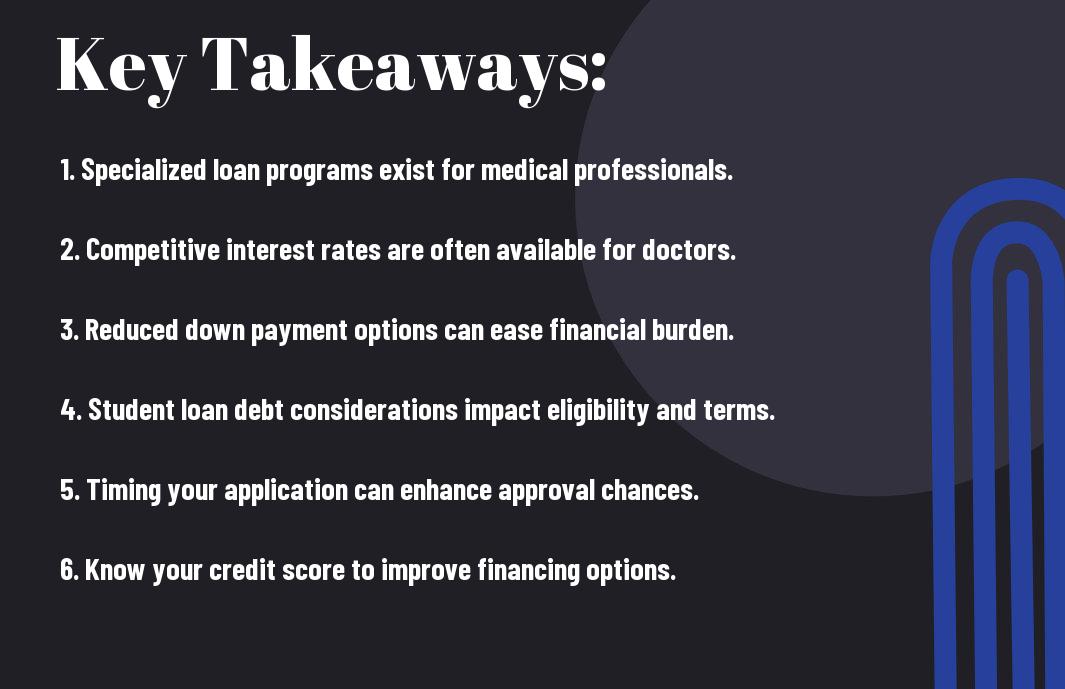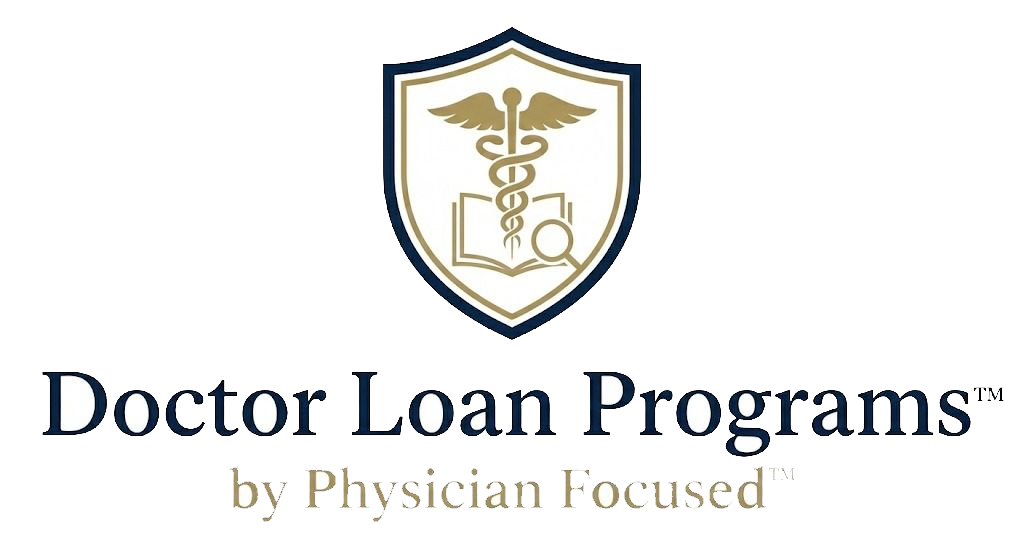Most medical professionals are focused on their practice, but understanding home loan programs can lead to significant benefits for you and your finances. As a doctor, navigating the home loan landscape can be daunting due to unique qualifications and obligations. Whether you’re a resident, attending physician, or seasoned practitioner, knowing the ins and outs of home loan options is necessary for making informed decisions that can ease your transition into homeownership. In this post, we’ll explore the top five things you should know to secure the best financing options tailored for your needs.
Understanding Home Loan Programs
For many doctors, navigating the world of home loan programs can be complex. Understanding the various types available to you is important. These programs cater to different financial situations and offer specific benefits designed to help medical professionals make informed decisions when purchasing homes.
Types of Home Loan Programs
For your consideration, here is a breakdown of common types of home loan programs:
- Conventional Loans
- FHA Loans
- VA Loans
- USDA Loans
- Jumbo Loans
Recognizing the differences can help you find the perfect fit for your financial goals.
| Loan Program | Features |
|---|---|
| Conventional Loans | Flexible terms, might require larger down payment. |
| FHA Loans | Lower down payments, ideal for first-time buyers. |
| VA Loans | No down payment, exclusive for veterans and active-duty service members. |
| USDA Loans | No down payment for eligible rural properties. |
| Jumbo Loans | Higher loan amounts for properties exceeding conforming loan limits. |
Eligibility Requirements for Doctors
Across various loan programs, eligibility requirements specifically tailored for doctors can significantly enhance your purchasing power. Many lenders recognize the financial stability of healthcare professionals and offer specific advantages that might not be available to other borrowers.
Understanding these eligibility requirements can provide you with valuable insights into the loan process. Factors typically include your income level, employment stability, and credit score. Additionally, some lenders may offer special programs that further accommodate your unique financial situation as a physician, allowing for higher loan limits, reduced down payments, or favorable interest rates. It’s important for you to explore these options to maximize your home-buying potential.

Benefits of Home Loan Programs for Medical Professionals
Even as a medical professional, navigating the housing market can be daunting, but home loan programs specifically designed for your field offer valuable advantages. These programs cater to your unique financial situation, allowing you to secure a home more easily. From competitive interest rates to favorable terms, they aim to alleviate some of the stress associated with home buying. Understanding these benefits can empower you to make informed decisions about your future investments.
Low or No Down Payment Options
Options for low or no down payment can make homeownership a more attainable goal for you as a medical professional. With certain programs, you may be able to finance your new home without the hefty upfront costs typically associated with conventional loans. This not only preserves your savings for other investments but also allows you to enter the real estate market sooner, maximizing your potential for building equity in your property.
Special Interest Rates and Terms
Professionals in the medical field often benefit from special interest rates and terms on home loans. These tailored options are designed to accommodate your unique financial profile and career trajectory. They can include lower interest rates, reduced mortgage insurance premiums, or extended loan terms that help manage your monthly budget effectively.
Due to your profession’s stable income and high earning potential, lenders may offer incentives such as reduced rates and favorable loan terms exclusively for medical professionals. This means you can secure a mortgage that aligns better with your financial goals. By taking advantage of these offerings, you position yourself to achieve homeownership more comfortably, allowing you to focus on your medical career while nurturing your personal investment. Understanding these specific options can significantly impact your financial strategy and homeownership experience.

The Application Process
Not only does the home loan application require careful preparation, but it’s also important to understand the steps involved. As a busy doctor, you may have limited time, but being organized can streamline the process. Make sure to familiarize yourself with the timeline, as it can vary depending on the lender and program you choose. You can expect to provide various documents and possibly undergo a credit check, all while ensuring that your financial history accurately reflects your ability to manage a loan.
Documentation Required
Documentation is key to a smooth application process. Lenders will typically request proof of income, tax returns, recent pay stubs, and your employment history. It’s also wise to gather documents related to any existing debt, such as student loans. The more organized you are with your documentation, the faster your application will progress.
Tips for a Successful Application
Required information can often feel overwhelming, but a few key strategies can lead you to success. Focus on presenting your financial situation clearly and accurately. Consider these tips:
- Maintain a good credit score by paying bills on time.
- Keep your debt-to-income ratio low by managing expenses.
- Be transparent with your lender about your financial situation.
The preparation you invest now can result in smoother approval down the line.
A well-rounded application can make all the difference in securing your home loan. Take the time to fill out your forms thoroughly and accurately. Consider these additional suggestions:
- Engage a knowledgeable mortgage broker for guidance.
- Clarify any uncertainties with your lender before submitting documents.
- Submit your application promptly to avoid delays.
The effort you put into your application will pay off in the form of homeownership advantages.
Common Pitfalls to Avoid
Once again, navigating home loan programs can be tricky, and many doctors fall prey to common pitfalls that can hinder their financial journey. Being aware of these issues helps you make informed decisions and secure the best possible mortgage for your needs.
Misunderstanding Loan Terms
Loan terms can often seem complex and convoluted, leading to confusion if not clearly understood. You should take the time to familiarize yourself with concepts like interest rates, loan types, and repayment schedules to ensure you’re making the right choices for your financial situation.
Failing to Shop Around
Shop around for various lenders and mortgage products, as options can differ significantly. Not taking the time to compare rates and terms can lead you to miss out on better deals that could save you a substantial amount over the life of the loan.
In fact, exploring multiple lenders not only allows you to see a spectrum of interest rates but also provides insight into different loan programs available for physicians. Many lenders offer specialty loans tailored for doctors that come with unique perks. By actively seeking out these options, you can ensure that you choose a loan that best fits your financial goals and lifestyle.
Additional Resources and Support
Many doctors may not be aware of the plethora of resources and support available to help navigate the complexities of home loan programs. Industry-specific organizations, financial advisors, and mortgage brokers can significantly ease the process, providing tailored advice to meet your unique needs. By tapping into these sources, you can enhance your understanding and streamline your home-buying experience.
Professional Organizations
Across the country, there are numerous professional organizations dedicated to supporting doctors and their financial needs. These associations often offer educational resources, networking opportunities, and advocacy related to home loan programs. Engaging with these organizations can provide you with valuable insights and connections that may simplify your path to homeownership.
Financial Advisors and Mortgage Brokers
Professional advisors and mortgage brokers can provide you with tailored guidance to help you secure the best home loan option suitable for your circumstances. Their expertise in navigating the mortgage landscape ensures you understand your financing options, including special programs available for medical professionals.
Mortgage brokers act as intermediaries between you and lenders, saving you time and effort by comparing various loan products. These professionals have vast knowledge of the market and can tailor solutions specific to your financial situation, helping you avoid common pitfalls. By working closely with both financial advisors and mortgage brokers, you will be better equipped to make informed decisions about your home loan and position yourself for financial success.
Conclusion
To wrap up, understanding the top five things about home loan programs will empower you as a doctor to make informed financial decisions. Your eligibility for specialized programs, the importance of credit scores, and the various options available to you can significantly affect your home-buying experience. Knowing how to leverage these opportunities can help you secure better rates and benefits. By equipping yourself with this knowledge, you’ll be well-prepared to navigate the complexities of mortgage options tailored for your profession.




